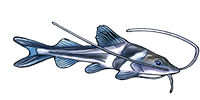I recently bought a 2 inch L25 pleco.
I placed him into my pleco tank which houses some bigger L24s , L200, L128, L048 and L014.
since i bought him i have not seen him come out to eat, though i know his hiding spot in the big Driftwood , every time i drop some food my old PSeudas would come out to eat , since i've had them for a while now, but have not seen my L25 come out to join them.
how do i make sure he also gets food to eat? i do drop a lot of food even when lights off but not sure if he comes out.
or would it be better to have him in a separate tank on his own?
Mixing Different sized Pseuda pleco
- Barbie
- Expert
- Posts: 2963
- Joined: 03 Jan 2003, 23:48
- I've donated: $360.00!
- My articles: 1
- My images: 16
- My catfish: 2
- My cats species list: 58 (i:0, k:0)
- Spotted: 8
- Location 1: Spokane, WA
- Location 2: USA
- Contact:
Re: Mixing Different sized Pseuda pleco
This one is hard to say, honestly. They can be quite obnoxious with newcomers. I would probably put him in a separate tank if you have one up and established already, just to ensure that shipping stress didn't keep him from thriving.
Barbie
Barbie
-
squid
- Posts: 378
- Joined: 24 Feb 2004, 12:30
- Location 1: Philippines.
- Interests: Tropical fish, internet, swimming, sleeping...
Re: Mixing Different sized Pseuda pleco
thanks




